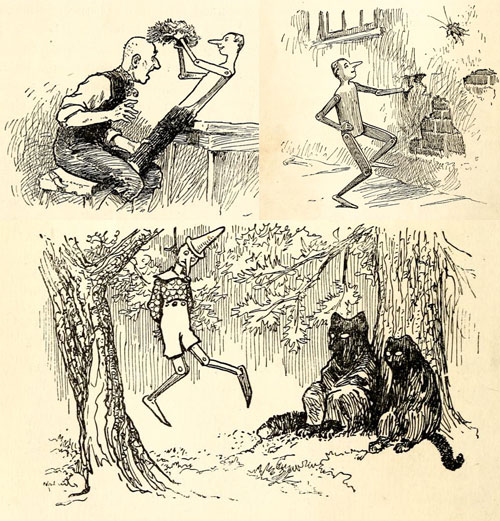Halloween
The New York Review of Books recently ran a list of recommended books for Halloween, and amongst them was Carlo Collodi’s 1882 novel Adventures of Pinocchio. For those who know the magnificent Disney version, this may come as a surprise, but seeing the title took me back my traumatic childhood experience reading the novel. Pinocchio is indeed a horror show.
Collodi’s Pinocchio misbehaves far worse than Disney’s, at one point bludgeoning his cricket conscience to death. But the scene that haunts me to this day is the one that New York Review of Books undoubtedly had in mind. If you are reading this post with small children, you may want to cover their eyes or ears as you read the following extended passage.
Fleeing two robber assassins, Pinocchio comes across a lone house in the woods. He bangs on the door and, while he thinks he finds someone at home, he quickly discovers otherwise:
As knocking was of no use, Pinocchio, in despair, began to kick and bang against the door, as if he wanted to break it. At the noise, a window opened and a lovely maiden looked out. She had azure hair and a face white as wax. Her eyes were closed and her hands crossed on her breast. With a voice so weak that it hardly could be heard, she whispered:
“No one lives in this house. Everyone is dead.”
“Won’t you, at least, open the door for me?” cried Pinocchio in a beseeching voice.
“I also am dead.”
“Dead? What are you doing at the window, then?”
“I am waiting for the coffin to take me away.”
After these words, the little girl disappeared and the window closed without a sound.
“Oh, Lovely Maiden with Azure Hair,” cried Pinocchio, “open, I beg of you. Take pity on a poor boy who is being chased by two Assass—”
At this point the story becomes truly grim:
He did not finish, for two powerful hands grasped him by the neck and the same two horrible voices growled threateningly: “Now we have you!”
The Marionette, seeing death dancing before him, trembled so hard that the joints of his legs rattled and the coins tinkled under his tongue.
“Well,” the Assassins asked, “will you open your mouth now or not? Ah! You do not answer? Very well, this time you shall open it.”
Taking out two long, sharp knives, they struck two heavy blows on the Marionette’s back.
Happily for him, Pinocchio was made of very hard wood and the knives broke into a thousand pieces. The Assassins looked at each other in dismay, holding the handles of the knives in their hands.
“I understand,” said one of them to the other, “there is nothing left to do now but to hang him.”
“To hang him,” repeated the other.
They tied Pinocchio’s hands behind his shoulders and slipped the noose around his neck. Throwing the rope over the high limb of a giant oak tree, they pulled till the poor Marionette hung far up in space.
Satisfied with their work, they sat on the grass waiting for Pinocchio to give his last gasp. But after three hours the Marionette’s eyes were still open, his mouth still shut and his legs kicked harder than ever.
Tired of waiting, the Assassins called to him mockingly: “Good-by till tomorrow. When we return in the morning, we hope you’ll be polite enough to let us find you dead and gone and with your mouth wide open.” With these words they went.
A few minutes went by and then a wild wind started to blow. As it shrieked and moaned, the poor little sufferer was blown to and fro like the hammer of a bell. The rocking made him seasick and the noose, becoming tighter and tighter, choked him. Little by little a film covered his eyes.
Death was creeping nearer and nearer, and the Marionette still hoped for some good soul to come to his rescue, but no one appeared. As he was about to die, he thought of his poor old father, and hardly conscious of what he was saying, murmured to himself:
“Oh, Father, dear Father! If you were only here!”
Believe it or not, this is how the original series ended. In other words, obey your father or die.
The public, however, wanted more, which meant that Collodi had to create the Blue Fairy to resurrect him. The book now ends as the film does.
In The Uses of Enchantment, Bruno Bettelheim famously accuses Disney of having robbed the Grimm Brothers’’ fairy tales of their psychic power by sugarcoating them, but in the case of Collodi I find it hard to fault the animator. Nothing in my life prepared me for the rough education dished out to the misbehaving Pinocchio. I remember emerging from the novel in a state of shock.
As I recall, I read the novel only once.
